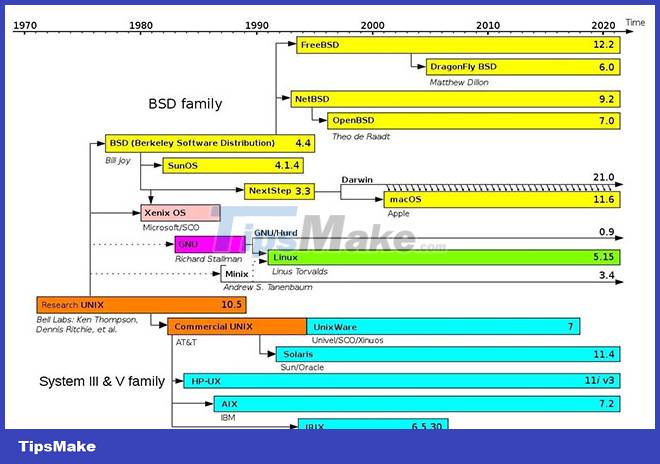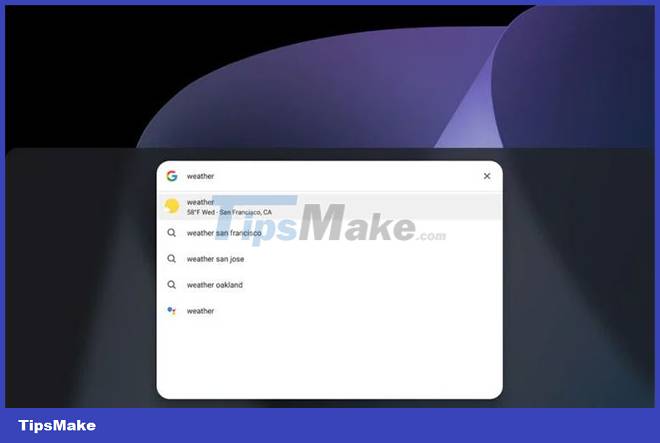Why does Linux have so many distributions?
Unlike Windows and macOS, installing Linux is not easy. Searching for the keyword Linux on the Internet will bring you a lot of operating systems with different names, but there is no operating system called "Linux". Why is that?
Linux is increasingly becoming the operating system of choice for seasoned tech enthusiasts and casual users alike. But why are there thousands of operating systems or "distributions" all collectively referred to as "Linux"? And why do developers keep creating so many operating systems of the same kind? Let's find out with TipsMake through the following article.
What is a Linux distribution?
First, it's important to know what Linux really is. Linux is not an operating system but a kernel, the component that connects the computer hardware to the operating system. When you launch an application on your computer by clicking on an icon, it is the kernel that communicates with the operating system to launch the application and display the output on the screen by hardware, i.e. screen.
An operating system consists of an underlying kernel, applications, and usually a graphical user interface. Linux is the kernel and all operating systems that use it are called "Linux distributions". The term "distribution" comes from the process of sharing a Linux-based operating system with other users, also known as a "distribution" because the kernel and operating systems are generally free.
What made so many Linux distributions?
The Linux kernel is licensed under the GNU General Public License, allowing anyone to view, edit, and distribute any application of the kernel. But it's not always like this.
Before that, Unix was a popular operating system, but its source code was owned by AT&T. After a while, BSD (Berkeley Software Distribution), a largely Unix-based operating system, was born at the University of California, Berkeley. There were also many other Unix-based operating systems at the time, and they were all very different.
The lack of a standard for creating Unix-based operating systems and the antagonism between operating systems at the time led to the era known as the "Unix wars". Various vendors distributed their own versions of Unix and began to set their own standards, including AT&T and BSD.

In 1983, Richard Stallman started the GNU Project, which focused on the development and distribution of free and open source software. The GNU Project aims to create a free version of Unix, one that anyone can copy and freely distribute.
Many applications were developed under the GNU General Public License at the time, including TAR and Emacs. But the project lacks an open-source kernel, the part of the computer that helps the operating system and applications interact with the hardware.
In 1991, eight years after the GNU Project started, Linus Torvalds started developing Linux. And a year later, Linux was re-released under the General Public License, becoming what we now call GNU/Linux. Since the Linux kernel is licensed under the GPL, anyone can create an operating system on top of it and distribute it freely.
The ability to create their own operating systems for free has encouraged many developers to start creating their own distributions. A variety of distributions including Debian, Red Hat, and Slackware were released at the time, starting the Linux revolution.
Why are new Linux distributions created?
The main reason developers continue to create and distribute new Linux-based operating systems is simply because it's something they can do. Linux kernel and free applications. The resources to create an entire operating system on the kernel don't cost a dime either.
Nowadays, one rarely creates a distribution from scratch. Instead, they use another popular distribution and build a new operating system using the old operating system as a base or remake it with a new graphical user interface and applications. add.
Ubuntu has several versions, like Xubuntu, Kubuntu and Lubuntu. The only difference between these 3 versions is the desktop environment. Instead of the default customized GNOME desktop that comes pre-installed on Ubuntu, Xubuntu, Kubuntu and Lubuntu have XFCE, KDE Plasma and LXDE respectively.
The main goal of the operating system is to make the desktop easier for users. When someone wants a new feature in an operating system, the traditional route is to provide feedback to the company that developed the operating system. The GNU Project has completely changed this.

It is the users themselves who will use, develop, provide feedback, deploy and, ultimately, distribute an open source distribution. You are free to create your own distribution and add desired features in your own dream operating system.
Anyone with the same thoughts and opinions can contribute to the project and help the developers. There's no need to contact a company or fill out a feedback form just to get an extra feature to add to the operating system.
Not only users, but even large companies create new distributions for internal use within the company. Microsoft's CBL-Mariner is a prime example. This is mainly because large companies do not want to use distros created by other users and want to develop their own operating systems from scratch or based on another mainstream distro.
The Linux project has grown to the point where tech giants like Google have also started to depend on the Linux kernel for some projects. Take Android and Chrome OS as examples. Android uses the Linux kernel internally, and Chrome OS is built on top of Gentoo Linux, a distribution released in 2000.

Another reason for the fragmentation of the Linux desktop is the wide variety of devices available. In addition to desktops, other devices such as those based on ARM processors, also require an operating system to run. Linux solves this problem by providing the facility for developers to create an operating system for any processor they want.
Raspbian OS is a distribution created specifically for Raspberry Pi devices. You can also find countless distributions developed to run on older processors that are not supported by proprietary operating system vendors.
Is there really a need for so many distros?
If you are someone who simply needs a computer and an operating system to get the job done, of course not. You can use any operating system as long as it suits your capabilities. But for those who want more options when it comes to devices and digital lives, Linux is the right choice.
You can try several Linux operating systems and choose the one you find best, or keep copying and testing new distributions. Linux gives you that choice. As long as people continue to support and contribute to the open source ecosystem, you will continue to see new distributions developed and released for free on the Internet.
That's how open source works!
Although many proprietary operating systems like Android and macOS have closed source code bases, they used Linux as the foundation of their projects. This is perfectly acceptable because the license under which the Linux kernel is released allows anyone to modify and distribute the code without any restrictions.
Due to the huge community support behind Linux-based operating systems, new and exclusive features are constantly being added to the distributions. While you can find many of these features on other proprietary operating systems like Windows and macOS, some of them are limited to a handful of Linux distributions.